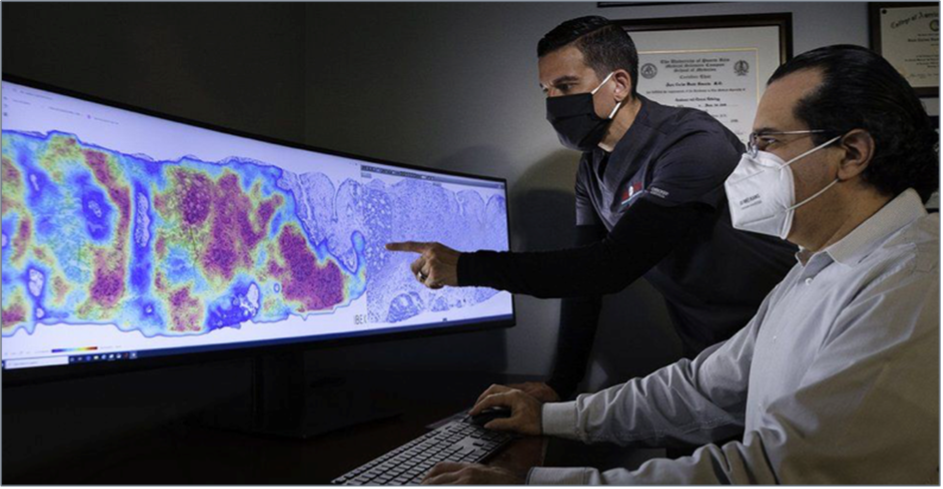Ibex Medical Analytics responded to an NHS Wales Challenge issued by Contracts for Innovation to improve response times to prostate biopsies. Their Artificial Intelligence (AI) technology solution automatically analyses and categorises digital images of pathology samples and so far, has helped identify 13% more prostate cancers in Wales.

The Challenge
Pathologists review four million glass slides holding prostate tissue samples from 100,000 men in Wales each year. However, it is expected that the number of men biopsied will double by 2030, and the tests performed are increasingly complex. In addition, the pressures of the Covid pandemic have led to a backlog of patients with suspected cancer – and to add to the pressures, there is a shortage of pathologists.
We offered an ‘unmet need’ session with clinical teams from NHS Wales Pathology and other health and public sector colleagues and then developed an Expression of Interest (EOI). People said the challenge model was so refreshing, as they could focus on understanding the issues rather than worrying about what a solution might look like. Once the EOI was issued, we received expressions of interest from applicants, including from Ibex Medical Analytics. Reviewing the applications was exciting because some of the proposed solutions were so creative, but Ibex’s proposal to use AI really stood out.
– Joy Browning, SBRI CoE
This project was a collaboration between the Welsh Government, SBRI Centre of Excellence, and NHS Wales Pathology. The Histology Team within Betsi Cadwaladr UHB took the lead, with colleagues from Swansea Bay and Aneurin Bevan University Health Boards (UHB). SBRI Centre of Excellence (SBRI CoE) were the project managers.
The Welsh SBRI Centre of Excellence (SBRI CoE) was established in September 2018. The Centre is fully funded by the Welsh Government and hosted by the Betsi Cadwaladr University Health Board (UHB). They are embedded in the NHS to work via the medium of SBRI challenge-led innovation within health and the wider public sector.
The solution
Ibex Medical Analytics responded to the Challenge by proposing the development of an AI tool that could automatically analyse digital images of pathology samples, classifying them through a traffic light system as having a higher or lower likelihood of cancer prior to a review by clinicians. By categorising the images, the most urgent cases are prioritised, and patient outcomes are improved through faster diagnosis and potentially having to undergo fewer biopsies and additional testing.
Saving lives
SBRI Centre of Excellence funding enabled Ibex to identify a robust, validated, clinically assured Artificial Intelligence (AI) technology solution. As a result, Betsi Cadwaladr University Health Board, Swansea Bay University Health Board and Aneurin Bevan University Health Board jointly became the first to use the application to help diagnose patients.
Following successful trials analysing prostate biopsies, which saw a 13% increase in cancer detection, the IBEX Galen AI platform is now being trialled in suspected breast cancer cases at Betsi Cadwaladr Health Board. By reducing the number of repeat biopsies, there is an estimated cost saving of £1,582 per biopsy.
The IBEX AI platform is now undergoing further testing within six health boards with the ambition to make this technology part of routine prostate cancer testing and potentially also help diagnose additional cancers.
Early detection saves lives; it was an amazing deployment journey to show how AI expedites and improves the quality of prostatic pathology diagnoses in Wales. This technology not only improved our cancer pick-up rate but also helped us refine various prognostic indicators more objectively. The computational pathology in the prostate led the way for the development and deployment of technology in other specialities; currently, work is being carried out on breast, colorectal, lymphoma, upper GI and PDL1 lung cancers.
– Muhammad Aslam, Consultant Pathologist and Clinical Director, BCUHB
The future
Contracts for Innovation enables innovators to address the challenges facing the world today while improving the UK’s public services. It is part of Innovate UK’s ambitions for net zero, digital and technologies, healthy living, and place that will collectively bring sustainable prosperity to economies, people, and the planet.
The NHS Wales clinical team is keen to use the Challenge model to explore further opportunities to use AI to improve services and health outcomes.
This Challenge has made a huge difference to so many people. These biopsies are classed as non-urgent, but we know that among them, there will be cancerous samples, and we all know there’s a real person – someone’s husband, brother or dad – behind that biopsy slide. I would encourage the public sector to bring us their challenges and to work with us. We want everybody to participate, to grasp the amazing opportunities for people with innovative ideas to come forward and get their foot in the door of the public sector.
– Joy Browning, SBRI CoE

